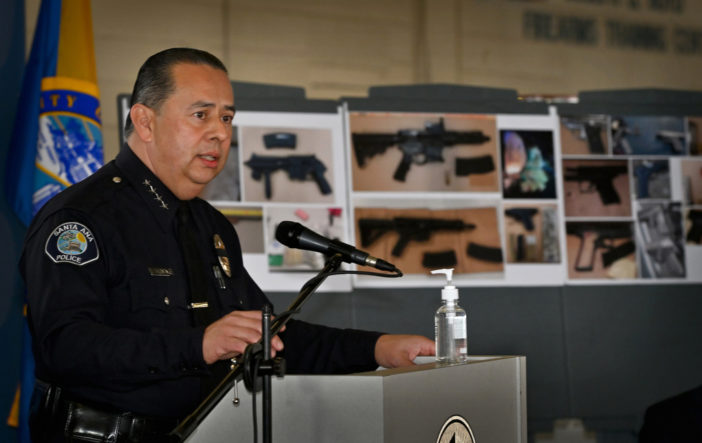There are those who might contend that gambling is a victimless crime.
But in Santa Ana, the proliferation of slaphouses, as many illegal gambling dens are called, have had deadly consequences.
The Santa Ana Police Department was already a couple months into a crackdown on violent crimes, including illegal gambling dens, when a man was shot dead on Feb. 16 just outside one of the illicit gambling establishments on the 300 block of North Harbor Boulevard.
The death of the unidentified man was one of three this year believed to be connected to a slaphouse and the eighth homicide in Santa Ana this year, compared to just one murder in the city in the same time span last year.
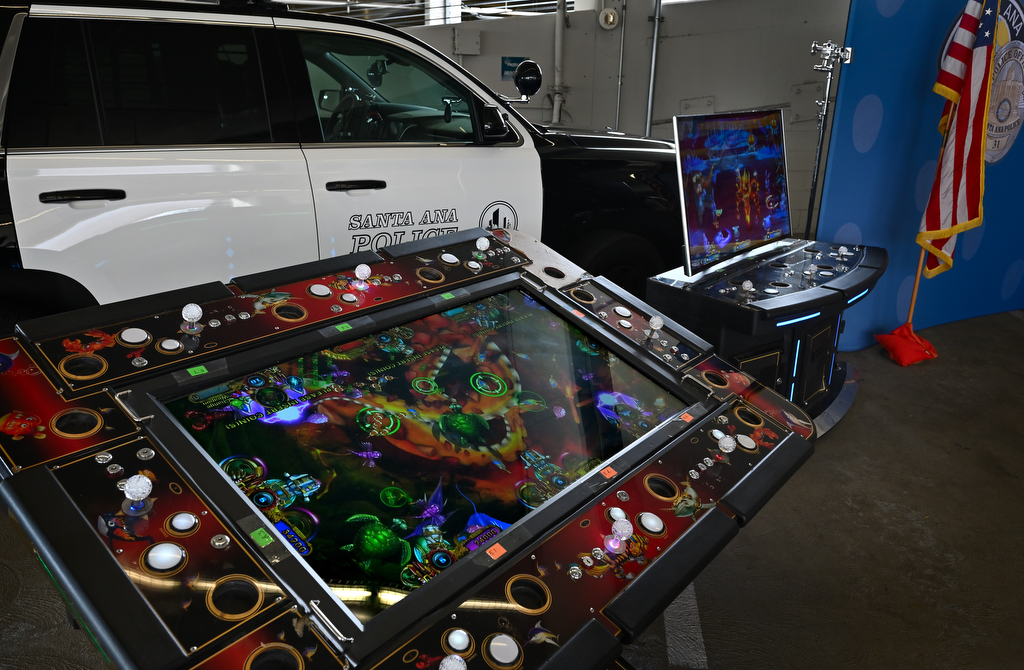
A couple of gambling machines confiscated by the Santa Ana Police Department from what are known as slap houses.
Photo by Steven Georges/Behind the Badge
Commander Jose Gonzalez, who heads the Santa Ana Police Department’s Crimes Against People and Special Investigations units, said the police had noticed the uptick in gambling crimes in the past year.
“Then the homicides really opened our eyes,” he said. “Once you see up and close the violence, you have to do something.”
The shooting kicked the gambling enforcement side of the crackdown into overdrive.
“We had been hitting a location a week starting in January,” Gonzalez said. “After that we were hitting them every day.”
In the two weeks following the slaying, which Gonzalez said began in a slaphouse and spilled into the streets, 21 of the 41 establishments identified since the operation began in January were shut down in Santa Ana.
Operation Community First
On Thursday, the Santa Ana police unveiled the results thus far of their widespread crackdown on both violent crime and illegal gambling.
Police Chief David Valentin, who dubbed the overall effort “Operation Community First,” says the project is a three-pronged approach, employing police from across the department, code enforcement and the community to identify illicit operations, and outreach and collaboration with nonprofits and community groups.
In addition to the gambling-related killings, Valentin said four of the city’s murders were gang related and one was from a domestic dispute.
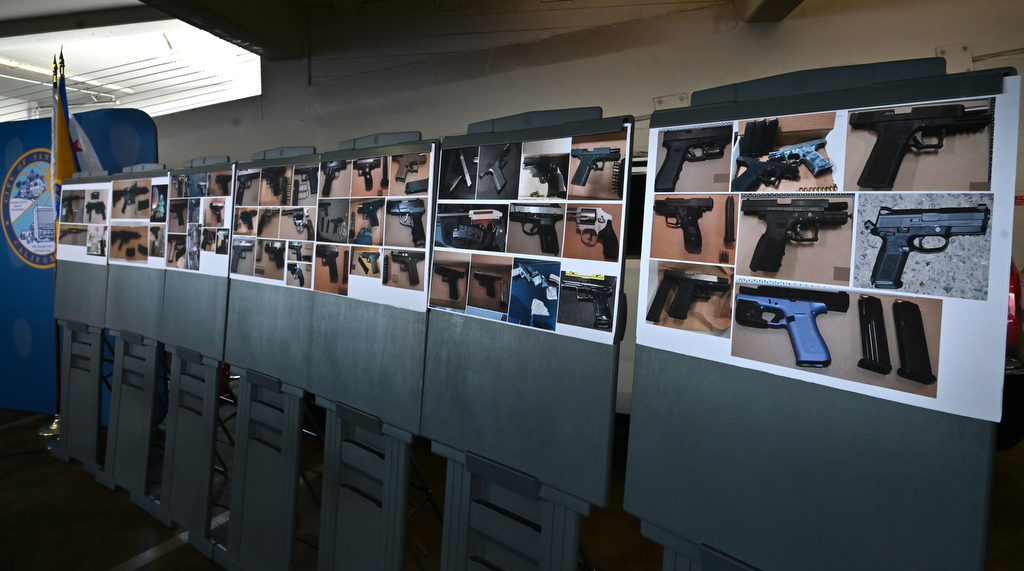
The Santa Ana Police Department displayed some of the 71 illegal weapons seized since the first of the year during a press conference at the police station.
Photo by Steven Georges/Behind the Badge
In addition to the murders, Valentin said there have been 37 shootings in the city this year.
To effectively address the crime rate, Valentin said the department is analyzing an array of statistics as a guide.
Valentin and Santa Ana Mayor Vincente Sarmiento said the recent crime spike is not unique to Santa Ana and has been mirrored in cities across the U.S.
A recent report from the National Commission on COVID-19 and Criminal Justice found that in 2020 homicides rose in 29 of the 34 major U.S. cities studied.
“A lot may have to do with the pandemic,” Sarmiento said. “People are going through emotional and psychological situations that make that happen.”
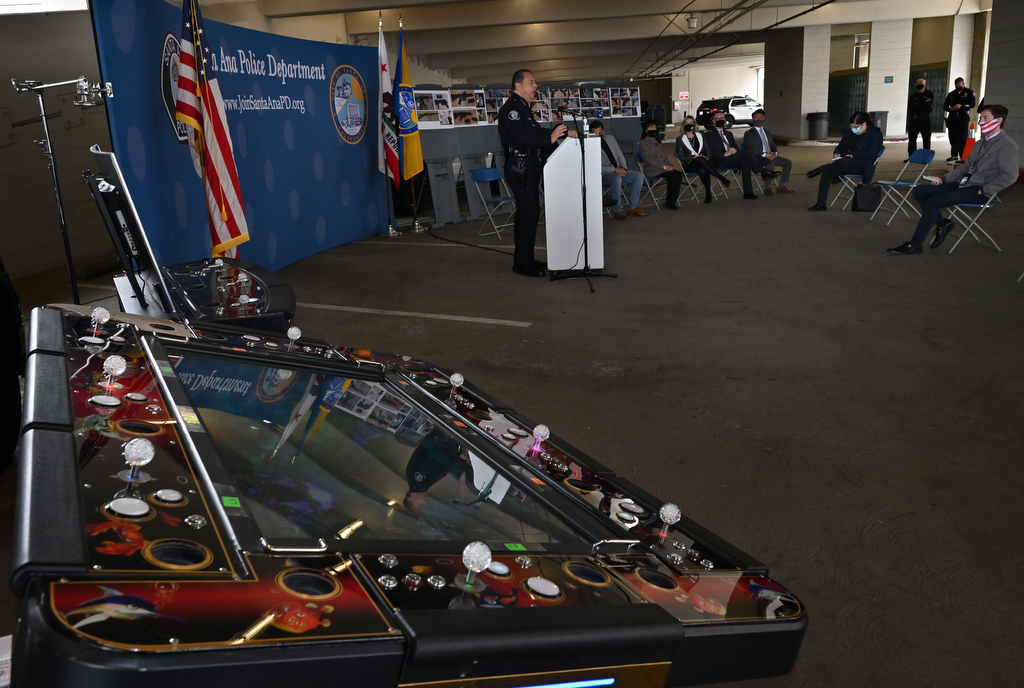
Santa Ana Police Chief David Valentin talks about the department’s response to an increase in crime during a press conference. On display are gambling machines confiscated from what are known as slap houses.
Photo by Steven Georges/Behind the Badge
As troubling as this year’s spike is, Valentin said it bucks a five-year trend of generally dropping homicides in Santa Ana, which fell from 23 in 2016 to 15 in 2020.
Violent crime sweeps
“We’re looking smartly at where the data is driving us,” Valentin said of enforcement.
So far, “Operation Community First” has involved the city’s specialized units, targeted and general patrols, Orange County Probation and the OC Violent Gang Task Force, consisting of U.S. Marshals, FBI and neighboring agencies, and has swept through Santa Ana and included an operation in Fullerton.
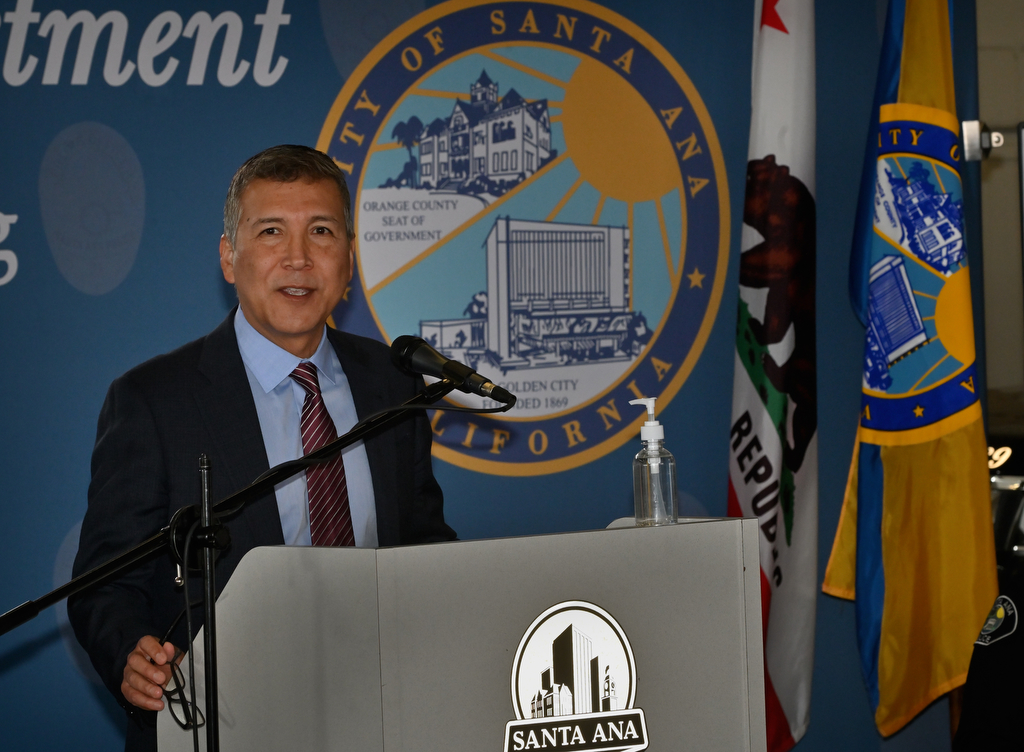
Santa Ana Mayor Vicente Sarmiento during a press conference to address the increase in homicides and violent crimes in the city.
Photo by Steven Georges/Behind the Badge
About the raid in Fullerton, Valentin said the task force executed search warrants targeting a violent street gang and “highlighted our ongoing commitment not only to our federal partners but jurisdictions across Orange County.”
In Santa Ana, the effort netted 71 firearms, ranging from handguns to assault rifles, about 250 arrests and seizures of cash and drugs.
Gambling houses
Since launching the operation, Santa Ana has closed 36 of the 41 known gambling locations found by code enforcement. There have been 103 arrests and seizure of 169 gambling machines, $87,111 in cash, a half-pound of narcotics and two firearms.
The surge in gambling houses and associated violence is a somewhat new phenomenon in the crime spike. Many of the operations are linked to Asian organized crime and protected by local gangs, according to Valentin.
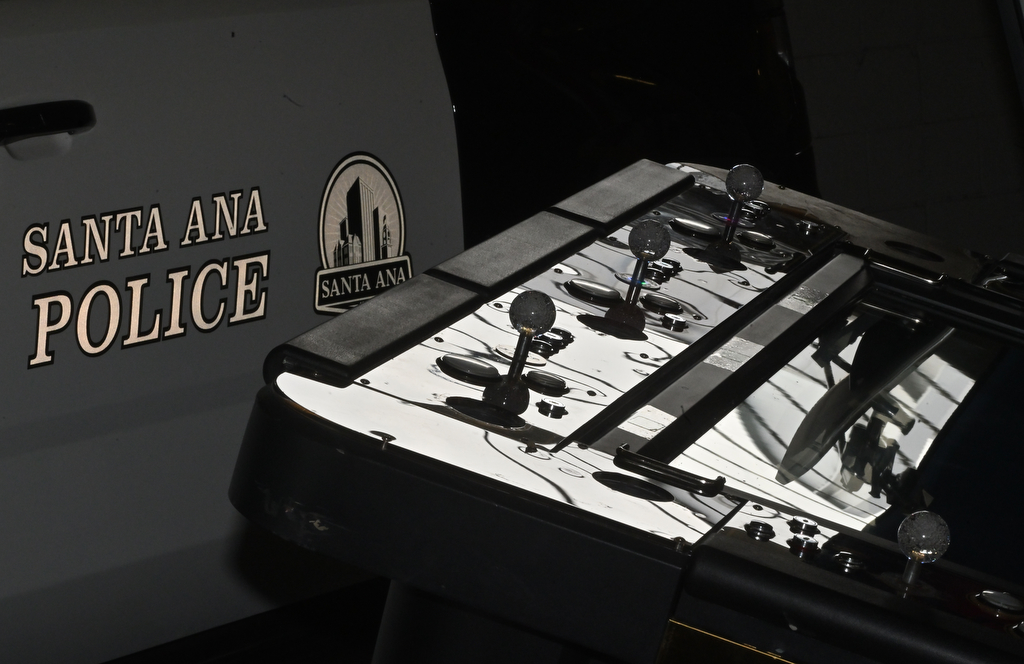
A gambling machine, confiscated from what is known as a slap house, is on display during a Santa Ana Police Department press conference to talk about Operation Community First.
Photo by Steven Georges/Behind the Badge
The slaphouses exist in a variety of locations, including existing storefronts — with or without the property owner’s permission — abandoned buildings, and even private homes. Generally, the dens have five to 10 tabletop video games, some that can seat up to eight people and authorities say can generate up to $10,000 per day.
The term slaphouse comes from the sound of players smacking the controls day and night as they attempt to pile up points. However, unlike video games of skill, officials say these are games of chance and, as such, illegal.
Far from being benign, these gambling operations are often linked to wider crimes, from drug and firearm use, to being incubators for theft, robbery, and other crimes to support gambling habits, according to Gonzalez.
Particularly troublesome are the establishments that open near homes and in residential areas.
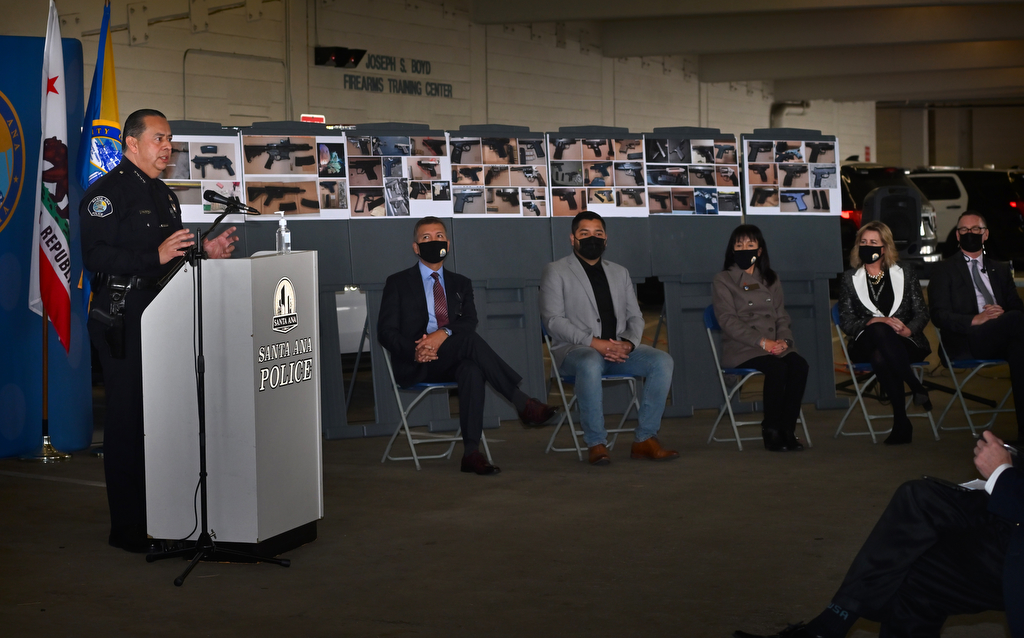
Responding to a year-to-date increase in violent crime and homicides, Santa Ana Police Chief David Valentin, with council members in attendance, talks about how the department has responded with Operation Community First.
Photo by Steven Georges/Behind the Badge
“We’re trying to bring some peace,” Gonzalez said. “Can you imagine being in a neighborhood and this activity is going on day and night? They’re not just in there in a dumbed down version of Las Vegas.”
Community engagement
Although the pandemic has dealt a blow to community events with the police, Valentin says the department remains committed to community police policies and partnerships.
The police have staged socially distanced events and pop-ups, such as community safety and preparedness booths. The department also continues to invest in social media platforms with situational messaging and other outreach efforts aimed, they say, at transparency.
Valentin also highlighted partnerships with nonprofits to improve education and crime prevention through programs such as the community and parent academies, the Police Athletic and Activity Leagues and the OC Gang Reduction and Intervention Program (GRIP).
“Operation Community First” is far from done, Valentin said.
“This is a first step,” he said. “Zero tolerance is here.”
 Behind the Badge
Behind the Badge
